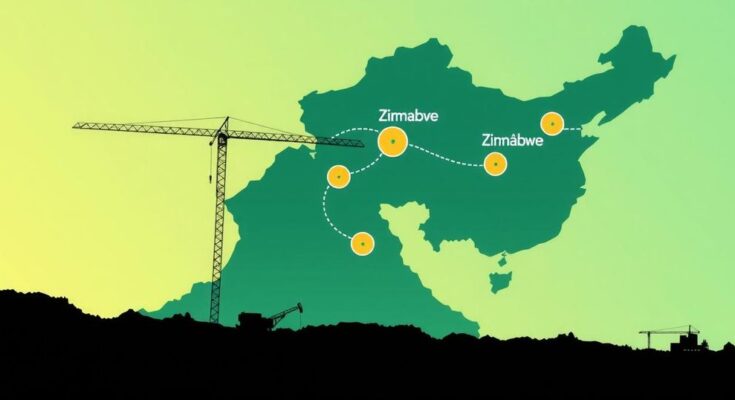Chinese mining corporations, including Zhejiang Huayou Cobalt Co. and Tsingshan Holding Group Co., are collaborating with a Zimbabwean state-owned company to develop a lithium deposit at Sandawana. Despite the steep decline in lithium prices, which have decreased by nearly 90% since late 2022, these firms are proceeding with a feasibility study and plan to invest $250 million to $300 million into the project. The anticipated output from the new facility is approximately 500,000 tons of lithium concentrate per year, with future price recovery expected shortly.
Chinese mining companies are advancing their initiatives to develop a lithium deposit in Zimbabwe, collaborating with a state-owned entity in the nation. Despite a significant downturn in lithium prices, these companies are undertaking a feasibility study to establish a mining and processing facility at Sandawana, located in the southern region of Zimbabwe. Recently, Zhejiang Huayou Cobalt Co. and Tsingshan Holding Group Co. have confirmed their involvement in this project, building on previous investments and projects within the country. This information was validated by the CEO of Kuvimba Mining House, the entity that holds ownership of the asset, although the identities of the partners were not disclosed until now. Over the past two years, Zimbabwe has emerged as a vital contributor to the global lithium market, particularly following the substantial price increases observed in 2021 and 2022, which drew considerable interest and investment from Chinese corporations eager to exploit the nation’s abundant lithium resources. However, since late 2022, the spot prices for lithium have plummeted by nearly 90% due to a surge in supply that has outstripped demand from the electric vehicle sector. Notwithstanding this price slump, Chinese firms are resolute in their strategy to secure feedstock for their domestic operations. Mr. Trevor Barnard, the acting CEO of Kuvimba, indicated that Huayou and Tsingshan are poised to invest between $250 million and $300 million in the construction and operation of the lithium mining and processing facility, which is projected to yield approximately 500,000 tons of lithium concentrate annually. He expressed optimism regarding the future of lithium pricing, foreseeing a gradual increase over the ensuing year, with significant recovery anticipated by 2026 and 2027 as current surpluses evolve into deficits. Mr. Barnard emphasized, “Our economics show that we will still be a profitable business even at the current pricing levels.” Across Africa, the landscape of lithium mining and exploration is burgeoning, with active projects emerging in nations such as Namibia, Mali, Ghana, and the Democratic Republic of the Congo, although these initiatives remain relatively modest compared to the numerous undertakings in the Americas, Australia, and Europe.
The article discusses the collaboration between Chinese mining companies and Zimbabwean state-owned firms in the development of lithium resources in Zimbabwe, particularly at the Sandawana deposit. It highlights China’s growing investment in Zimbabwe’s mining sector, particularly in lithium, despite recent declines in market prices. Over the past couple of years, Zimbabwe has established itself as a notable player in the lithium market, attracting foreign investments due to the global increase in demand for lithium, largely driven by electric vehicle production. The article also provides insight into the future outlook for lithium pricing and the potential profitability of the mining initiative despite current challenges.
In conclusion, the collaboration between Chinese mining firms and Zimbabwe highlights the complexities and dynamics of the global lithium market. Despite facing a significant drop in prices, the ongoing investments and planned feasibility studies underscore a commitment to extracting and processing lithium in Zimbabwe. The optimistic outlook for lithium prices and the potential profitability of the mining operations suggest that the interests of both Chinese investors and the Zimbabwean economy are aligned towards fostering growth in this strategic sector. Such undertakings in Zimbabwe also reflect an emerging trend of increased lithium mining activity across the African continent, signaling its growing importance in the global supply chain for critical minerals.
Original Source: africa.businessinsider.com




